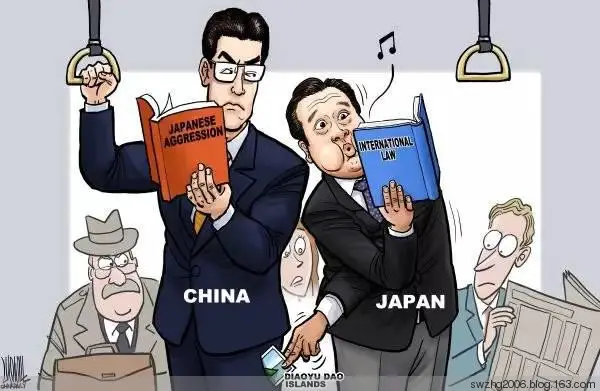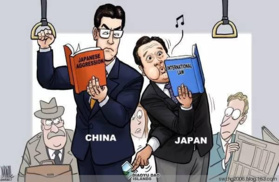Zhong Sheng, People’s Daily
During a recent visit to Washington DC, Japan’s Defense Minister Tomomi Inada once again described China as a “rule-breaker” on the issues of the East China Sea and South China Sea. Inada proposed that Japan hold more joint patrols and military exercises with the US and countries in the region with the aim to enhance its involvement in the contested South China Sea.
These statements from a senior Japanese official not only run contrary to fact, but also have the potential to undermine regional stability by instigating conflict.
Frustrated at being only regarded as an “economic power,” Japan set a goal for itself in the 1990s to become a political power as well. While Japan’s ambitions ended up going up in smoke, after the US introduced its “Asia-Pacific Rebalance” strategy, Japan rekindled its hope of growing into a global political or even military power.
In other words, it was the US’ Asia-Pacific strategy that resurrected Japan’s military and political ambitions, at the same time granting the once vanquished country the green light to challenge the post-World War II order. Future historians are sure to see this as a disgrace for Washington.
The so-called “China threat” that Inada has been pushing does not stand up to the light of truth. The Diaoyu Islands have been an integral part of Chinese territory since ancient times. This is an indisputable fact that is backed up by a series of international legal documents.
For this reason China is obliged to safeguard its own territorial sovereignty. Looking at international regulations, this right and Inada’s depiction of China as a “rule-breaker” are worlds apart. As to the so-called “broken status quo” in the East China Sea, Japan should not be hypocritical. The world knows that the first to “break the status quo” when it comes to the Diaoyu Islands is none other than Japan itself.
When it comes to the South China Sea issue, the arbitration case unilaterally filed by the Philippines violated international law and the general practices of international arbitration, and thus was invalid and unlawful from the very beginning.
Amid such a backdrop, China’s non-acceptance, non-participation and non-recognition of the "verdict" actually safeguards the integrity of international law as it is ridiculous to recognize the legitimacy of an “arbitration” carried out by a makeshift organization without any connection with the UN.
Tensions involving this political farce have cooled down recently, but Japan, instead of reflecting on its disgraceful role in this farce, has decided to repeatedly attempt to instigate conflict by cooking up stories in the international arena.
During the 11th East Asia Summit held in Vientiane not long ago, some US media, such as the Wall Street Journal, noticed the sharp differences that exist between ASEAN countries and some countries outside the region. According to their reports, ASEAN members have realized that instead of unnecessarily escalating regional tension, disputes should be met with practical solutions.
So what is hidden behind Japan’s petty tricks? Is the country once again being motivated by the desire to control the security of Asia and undermine the relationships between Asian countries?
Japan, a country notorious for breaking international laws, is in no position to prate about rules and the rule of law in front of the international community.
At its most basic, the Diaoyu Islands and their historical recognition are closely related to the post-World War II order, which has been clearly laid out in major international legal documents such as the Potsdam Proclamation and the Cairo Declaration .
However, even though 70-plus years have passed since the end of WWII, Japan has still not given up on instigating conflict, confronting world order and challenging the international rule of law.
For instance, some of Japan’s senior officials have gone so far as to rail against the Potsdam Proclamation, exculpate the country’s invasion of other sovereign states and deny the Nanjing Massacre and the existence of “comfort women”. These irresponsible behaviors indicate that Japan is turning a blind eye to the rules and the rule of law.
In reality, Japan is well versed in the history of the South China Sea. Once occupied by Japan during WWII, the islands were recovered by China based on the Potsdam Proclamation and the Cairo Declaration after the war.
If Japan is a country that respects the rules and the rule of law as it claims, it should not neglect the legal and historical facts concerning the South China Sea.
Even if we consider the “China threat” mentioned in Inada's speech an old rhetoric, military intervention in the South China Sea will without a doubt put regional stability at risk. The action plans detailed by Inada reveal not only Japan’s Cold War mentality, but also its intention to instigate group-confrontation.
Another dangerous sign is that after Japan adopted its new security bill lifting the ban on collective self-defense, the country has begun striding towards a military rise by instigating conflict.
However, today’s Asia-Pacific arena and the will of the people will not permit the reemergence of Japan's over-confident strategic restlessness and intentions to instigate group-confrontation. This is because, in this new era that focuses on win-win cooperation, no country wants to join Japan’s ambitious fantasy. And if Japan continues to play this game thinking its allies will stand by it, it will find the price to play is too high.
During a recent visit to Washington DC, Japan’s Defense Minister Tomomi Inada once again described China as a “rule-breaker” on the issues of the East China Sea and South China Sea. Inada proposed that Japan hold more joint patrols and military exercises with the US and countries in the region with the aim to enhance its involvement in the contested South China Sea.
These statements from a senior Japanese official not only run contrary to fact, but also have the potential to undermine regional stability by instigating conflict.
Frustrated at being only regarded as an “economic power,” Japan set a goal for itself in the 1990s to become a political power as well. While Japan’s ambitions ended up going up in smoke, after the US introduced its “Asia-Pacific Rebalance” strategy, Japan rekindled its hope of growing into a global political or even military power.
In other words, it was the US’ Asia-Pacific strategy that resurrected Japan’s military and political ambitions, at the same time granting the once vanquished country the green light to challenge the post-World War II order. Future historians are sure to see this as a disgrace for Washington.
The so-called “China threat” that Inada has been pushing does not stand up to the light of truth. The Diaoyu Islands have been an integral part of Chinese territory since ancient times. This is an indisputable fact that is backed up by a series of international legal documents.
For this reason China is obliged to safeguard its own territorial sovereignty. Looking at international regulations, this right and Inada’s depiction of China as a “rule-breaker” are worlds apart. As to the so-called “broken status quo” in the East China Sea, Japan should not be hypocritical. The world knows that the first to “break the status quo” when it comes to the Diaoyu Islands is none other than Japan itself.
When it comes to the South China Sea issue, the arbitration case unilaterally filed by the Philippines violated international law and the general practices of international arbitration, and thus was invalid and unlawful from the very beginning.
Amid such a backdrop, China’s non-acceptance, non-participation and non-recognition of the "verdict" actually safeguards the integrity of international law as it is ridiculous to recognize the legitimacy of an “arbitration” carried out by a makeshift organization without any connection with the UN.
Tensions involving this political farce have cooled down recently, but Japan, instead of reflecting on its disgraceful role in this farce, has decided to repeatedly attempt to instigate conflict by cooking up stories in the international arena.
During the 11th East Asia Summit held in Vientiane not long ago, some US media, such as the Wall Street Journal, noticed the sharp differences that exist between ASEAN countries and some countries outside the region. According to their reports, ASEAN members have realized that instead of unnecessarily escalating regional tension, disputes should be met with practical solutions.
So what is hidden behind Japan’s petty tricks? Is the country once again being motivated by the desire to control the security of Asia and undermine the relationships between Asian countries?
Japan, a country notorious for breaking international laws, is in no position to prate about rules and the rule of law in front of the international community.
At its most basic, the Diaoyu Islands and their historical recognition are closely related to the post-World War II order, which has been clearly laid out in major international legal documents such as the Potsdam Proclamation and the Cairo Declaration .
However, even though 70-plus years have passed since the end of WWII, Japan has still not given up on instigating conflict, confronting world order and challenging the international rule of law.
For instance, some of Japan’s senior officials have gone so far as to rail against the Potsdam Proclamation, exculpate the country’s invasion of other sovereign states and deny the Nanjing Massacre and the existence of “comfort women”. These irresponsible behaviors indicate that Japan is turning a blind eye to the rules and the rule of law.
In reality, Japan is well versed in the history of the South China Sea. Once occupied by Japan during WWII, the islands were recovered by China based on the Potsdam Proclamation and the Cairo Declaration after the war.
If Japan is a country that respects the rules and the rule of law as it claims, it should not neglect the legal and historical facts concerning the South China Sea.
Even if we consider the “China threat” mentioned in Inada's speech an old rhetoric, military intervention in the South China Sea will without a doubt put regional stability at risk. The action plans detailed by Inada reveal not only Japan’s Cold War mentality, but also its intention to instigate group-confrontation.
Another dangerous sign is that after Japan adopted its new security bill lifting the ban on collective self-defense, the country has begun striding towards a military rise by instigating conflict.
However, today’s Asia-Pacific arena and the will of the people will not permit the reemergence of Japan's over-confident strategic restlessness and intentions to instigate group-confrontation. This is because, in this new era that focuses on win-win cooperation, no country wants to join Japan’s ambitious fantasy. And if Japan continues to play this game thinking its allies will stand by it, it will find the price to play is too high.
 Menu
Menu
 Op-ed: Japan’s attempts to instigate conflict undermine regional stability
Op-ed: Japan’s attempts to instigate conflict undermine regional stability

















